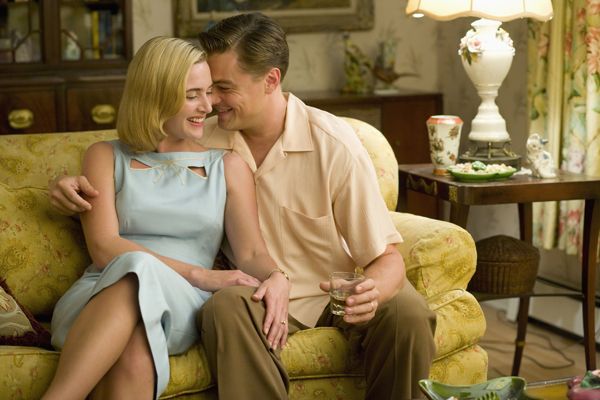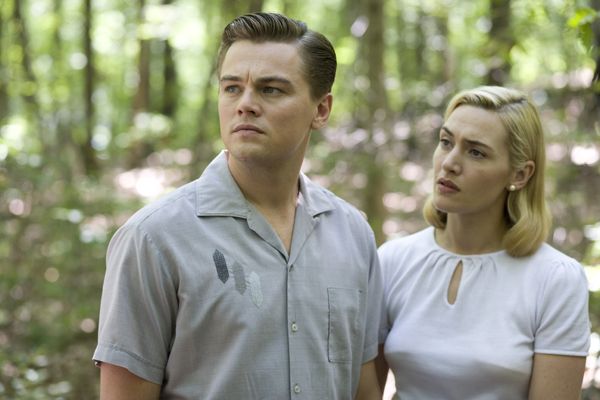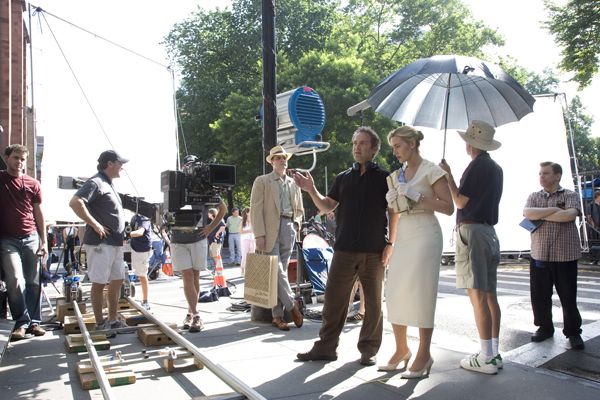There was quite a bit of buzz around this film when it first came out and I just couldn't bring myself to go to the theaters and watch a suburban couple rip each other a new one for two hours. So I waited, let the buzz die down a bit and then attempted to watch it with a clean slate perspective upon its Blu-ray release. I'm really glad I did this. The film's buzz had raised my expectations, but by giving myself time to forget all the critical hoopla I was able to sit back and appreciate it from my own perspective, not anyone else's that had been crammed down my throat during awards season. Although bleak and pretty damn depressing, is a very well made and interesting portrait of suburban married life in the 50's.
The plot follows the Wheeler family; on the outside they seem like the perfect couple in married bliss. Their friends and co-workers idolize Frank and April as an ideal, but behind closed doors they are constantly at each others throats and on the brink of completely falling apart. The movie follows the ebbs and flows of their tumultuous relationship, examining the effects of sacrificing your dreams and true potential for comfort and stability. Frank works a boring sales job and April wanted to be an actress, but has been downgraded to doing community theater and general housewife upkeep while her husband supports the family financially. After a huge fight and a moment of indiscretion, where Frank sleeps with a young secretary at work unbeknownst to April, the couple get the "great" idea that they need a change and should uproot their family and move to Paris. Paris is painted as this ideal place where Frank will be able to find how to be a man and decide what he really wants to do with his life, but the audience knows that this dream is as unattainable as a steady amount of happiness for the Wheelers. The couple has moments of hope, but ultimately their world comes crashing down around them in a very tragic way.
This film is pretty bleak in its view of marriage. All the couples in the film are unhappy, which made it hard at first to decide if I liked the film. As the story went on, I began to see the "hopeless, endlessness" of this lifestyle (as Michael Shannon's character brilliantly points out), that no matter what they do, happiness won't come because both of them have sacrificed too much. I started to see both sides of the argument and felt the pain of each character as they feel increasingly more trapped. It's a suffocating tone the film has and at times uncomfortable to watch, but when all was said and done I appreciated the film as a whole and the story it told.
Michael Shannon, easily my favorite character in the movie, plays a mentally disturbed man who is actually the most sane character in the movie, because he's the only one that sees what's really going on and points it out. He is like Shakespeare's fool, where no one takes him seriously, but he's the smartest one in the room. And did I mention his portrayal is brilliant! It's no wonder that even with just a few scenes he was nominated for the Academy Award. The acting in this film really stands out almost across the board. Kate Winslet is fantastic as usual and Leonardo DiCaprio really allows the audience to see the raw pain of his character, not to mention there's a hell of a lot of subtext between these two tangled characters. I felt Kathy Bates was a bit hammy, but her character lends itself to that. All around the ensemble is very well cast and plays their parts well to fit into the entire scope of the film.
The direction of the film, by Sam Mendes, is also heartbreaking and beautiful. Starting with sweeping dolly shots and bright beautiful colors and slowly moving to more shaky, hand-held, low-lit scenes as the characters fall deeper and deeper into despair. There's one moment that stands out in my mind towards the end when April says goodbye to Frank before he goes to work, she is completely in shadows and behind her is the bright light of the kitchen. It seemed like a pretty obvious, but appropriate, visual metaphor that the beauty of their lives and the purity of it was all behind her now and something very dark was about to happen. There are several moments of symbolism and foreshadowing that are delivered with grace and really lends to repeat viewings of the film, although maybe a few months later since it is really depressing.
I know some people had problems with all the yelling and felt that the film was just a melodrama about boring suburbanites and their "terrible lives." I disagree with this completely and feel that the film examines how the 50's were for young couples. How we as a nation had this front that we put up of being perfect and unscathed from World War II, but there was a deep dark underbelly to all these perfect facades and "Revolutionary Road" allows us to see that dark side of marriage and America in a pretty raw and exposed way.
SPECIAL FEATURES:
- Director and Screenwriter Commentary
- Deleted Scenes
- Lives of Quiet Desperation: The Making of Revolutionary Road
- Richard Yates: The Wages of Truth (my favorite feature because it's a pretty in-depth view of his life as an author and a man, told through the eyes of his children and close friends. It really gives great insight into where this book came from and how much of it was based on his life.)
- Theatrical Trailer
Film- B+
Features- B+




